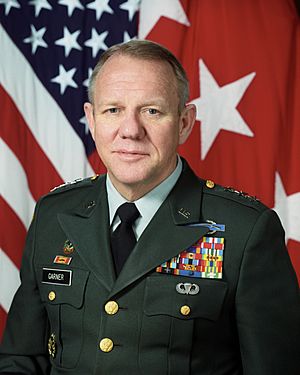Jay Garner facts for kids
Quick facts for kids
Jay Garner
|
|
|---|---|

Garner in 1996
|
|
| Director of the Office for Reconstruction and Humanitarian Assistance of Iraq | |
| In office April 21, 2003 – May 12, 2003 |
|
| President | George W. Bush |
| Preceded by | Saddam Hussein (President of Iraq) |
| Succeeded by | Paul Bremer (Administrator of Coalition Provisional Authority) |
| Personal details | |
| Born |
Jay Montgomery Garner
April 15, 1938 Arcadia, Florida, U.S. |
| Political party | Republican |
| Education |
|
| Military service | |
| Branch | |
| Service years | 1962–1997 |
| Rank | Lieutenant General |
| Commands |
|
| Conflicts | |
| Awards |
|
Jay Montgomery Garner (born April 15, 1938) is a retired United States Army lieutenant general. In 2003, he was chosen to lead the rebuilding of Iraq after its leader, Saddam Hussein, was removed from power.
Garner was in charge of the Office for Reconstruction and Humanitarian Assistance. This made him the temporary leader of Iraq. However, he was soon replaced by Ambassador Paul Bremer.
Contents
Early Life and Education
Jay Garner was born in Arcadia, Florida. Before college, he served in the United States Marine Corps. He later went to Florida State University and earned a degree in History in 1962. He also has a master's degree from Shippensburg State University.
Military Career
Garner joined the army in 1962. He served two tours in the Vietnam War. Later, he commanded air defense units in Germany. He also served as a deputy commanding general at Fort Bliss, Texas.
Garner was important in creating the Patriot missile system. This is a system designed to shoot down enemy missiles. During the Gulf War, he commanded missile units that used this system. After the war, he was in charge of protecting Kurdish people in northern Iraq.
Before retiring, Garner led the U.S. Army Space and Strategic Defense Command. This group worked on missile defense programs. He retired from the army in 1997 as a lieutenant general.
After his army career, Garner became the president of a company called SYColeman. The company made technology for missile systems. He also served on a special panel about space and missile threats, and worked with the Israel Defense Forces.
Leading the Rebuilding of Iraq
In 2003, the U.S. government chose Garner to lead the rebuilding of Iraq after the war. He had experience from his work with the Kurds in northern Iraq after the Gulf War. His job was to help Iraqis create a new government and reconstruct their country.
A Country in Chaos
After the war, there was a lot of confusion and disorder in Iraq. Important places, like the national museum, were being damaged. The country's infrastructure, like power and water systems, was in ruins. Government buildings were broken into and records were destroyed.
The U.S. government put General Garner in charge to try and bring order. His plan was to use some former Iraqi government officials to help run the country.
Forming a New Government
Garner wanted to hold elections within 90 days. He hoped to move U.S. troops out of the cities quickly. He worked with Iraqi leaders to help choose a new government.
In an interview, Garner said that many people had to join the old ruling Ba'ath Party to have a good career. He said his team did not have a problem with most of them. But they wanted to remove anyone who was part of Saddam Hussein's harsh rule.
On April 15, 2003, Garner held a meeting in the city of Nasiriyah with about 100 Iraqis to discuss the country's future. At a second meeting on April 28, five Iraqis were chosen as the main leaders of a new government:
- Masood Barzani
- Jalal Talabani
- Abdul Aziz Al Hakim
- Ahmad Chalabi
- Iyad Allawi
Challenges and Changes
Garner's choices caused some disagreement. Some Iraqis felt that the new leaders did not represent everyone. For example, people from the Shi'a religious group make up most of Iraq's population. But they felt they did not have enough leaders in the new government. Many also felt the leaders were not chosen in a democratic way.
Garner's plan for quick elections was eventually set aside. On May 11, 2003, after less than a month in charge, he was replaced by Paul Bremer.
Some people believe Garner was replaced because he disagreed with the White House. Garner wanted Iraqis to hold elections quickly and decide for themselves how to run their country and use its resources, like oil. He said, "It's their country ... their oil."
Garner was later interviewed in the 2007 documentary movie No End in Sight, which was about the handling of the Iraq occupation.
See also
 In Spanish: Jay Garner para niños
In Spanish: Jay Garner para niños
 | Precious Adams |
 | Lauren Anderson |
 | Janet Collins |

